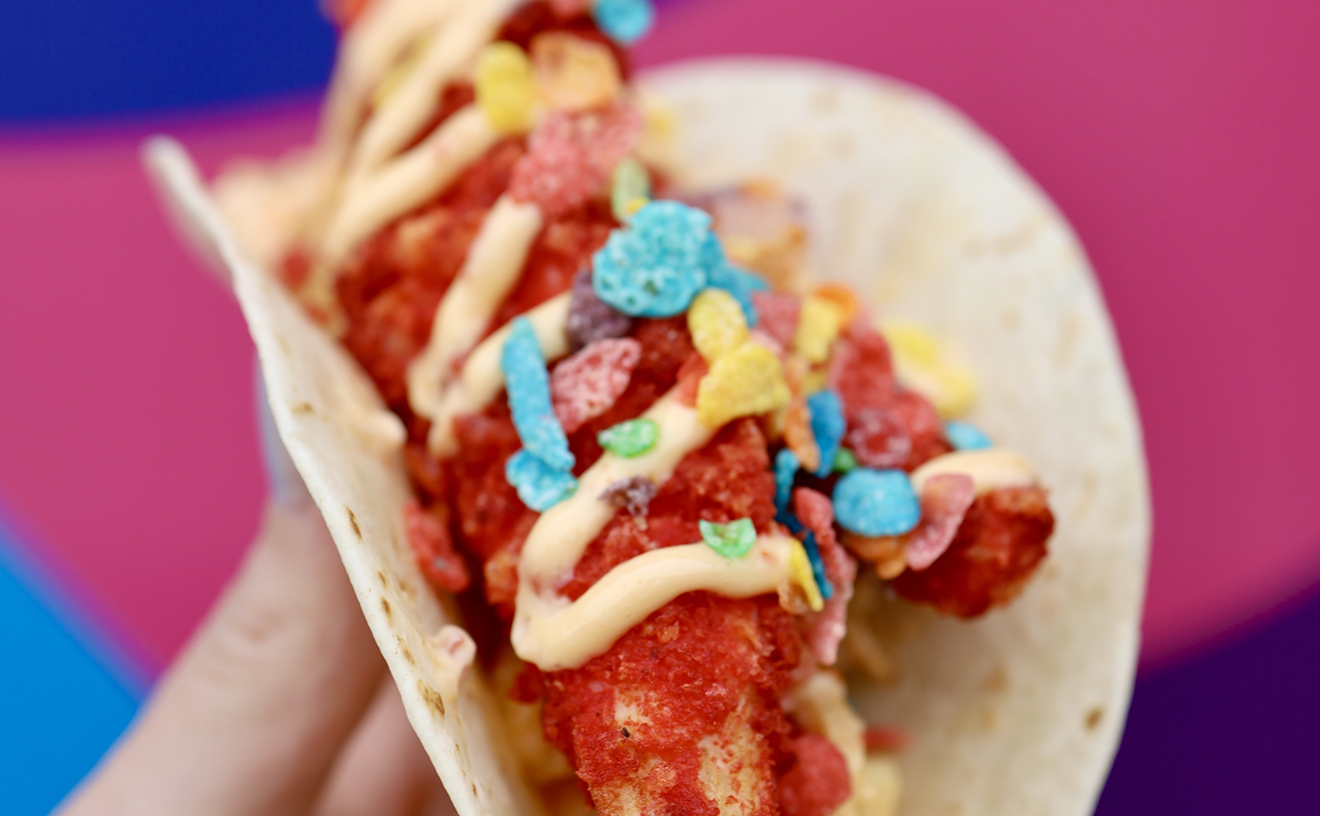The Little League field was a block from my house. I played there every night, forming best friendships and organizing games of tag. I learned to blow bubbles and crack my gum, and how to wear my cap. I was the first in my crowd to have a boyfriend.
But as much as I loved the Little League field, I hated baseball. Every social triumph off the field was matched by humiliation on it. I was a miserable player. I was hit in the back of the head with a ball during tryouts; I struck out on the batting tee. I never got the ice cream cone my father promised me for my first fly ball because I couldn't catch a single one. So I consoled myself with lesser treats -- the Jolly Rancher hard candies I bought at the field house with the spare change I found in the fine red dust, looking down when I was supposed to be looking up.
I could easily have construed the gigantic fish bowl filled with Jolly Ranchers at the door of the three-month-old Basque-French restaurant La Pelota Vasca as a bad omen. After all, these were the candies I slurped compulsively while standing far out in right field, hoping tart green apple or watermelon would overpower the bitter flavor of failure in my mouth. The athletic imagery couldn't be overlooked: The name of the restaurant translates as "The Basque Ball" A a reference not to baseball but to jai alai, a sport of northern Spanish origin. A cesta, the curved wicker basket used to catch and release the ball, hung like a bat on the wall opposite the bowl of candies. I had an urge to yell "Heads up!" and duck out of the place altogether.
Before I could make my escape, part-owner and maitre d' Sami Attias warmly greeted our party. The restaurant's countryish flair -- low ceilings, doubled tablecloths in pink over white, pink napkins in glasses, gold-painted stuccoed walls garlanded with dried flowers, baskets, and sconces -- registered, calming me. And the deciding factor: something delicious drifting on the air from the kitchen.
Spain's Basque country, in the northeast corner of the nation where it meets with southern France via the Pyrenees, contributes three things of distinction to the rest of the world: euskera, the native language that has a fascination with the letter X; jai alai; and the numerous sociedades gastron centsmicas, or private social clubs whose members prepare and eat gourmet meals together. La Pelota Vasca, also owned by Philippe Fiore, a chef and restaurateur of French birth and Spanish education, purports to serve the celebrated cuisine of this unique region, along with French fare.
Oddly, the French dominates. Waiters are a bit stiff and formal (with heavy French accents) but refreshingly polite and attentive. Bread baskets filled with hot rolls are replaced before they're empty. The menu features pate and escargot as appetizers, and though it boasts low-fat ingredients, there are plenty of buttery, creamy sauces on the main courses (few fishes, more numerous meats). Obviously, proximity to Biscayne Bay is not quite the same as proximity to the Bay of Biscay, where Basque fishermen hook lobster-rich spider crabs, baby squid to be stuffed and cooked in their own ink, and tiny angulas, baby saltwater eels to be stir-fried with hot peppers and garlic.
The closest we came to Biscayan waters was an entree of merluza, a special. Our waiter touted this as a Chilean fish cooked in a fat-free seafood bouillon, but he was wrong on both counts. Merluza is hake, or any one of a species of Atlantic cod, and oil was smeared on the plate. Still, the thick and flaky fish, poached in a shellfish-essence sauce, was tender and aromatic. At La Pelota Vasca, presentations are simple: A single oyster garnished this plate. But the vegetables that accompanied all entrees -- boiled carrots and a squash-zucchini melange accented with garlic-butter -- were sweet and generous. Starches varied according to the dish ordered. I admired the one here, a comely Yukon gold potato, peeled and boiled.
The kitchen and waitstaff are apt to make substitutions without informing the customer, and are not particularly honest. We asked whether magret du canard in a port wine sauce had been pre-prepared. The waiter assured us it was cooked to order, but the too-dry-for duck -- a boneless half of a bird rather than the advertised breast -- had a tough, stringy, reheated texture. Nor had port wine come within a country mile of this dish; it had been replaced by a heavy-cream green peppercorn sauce. A scoop of basmati rice (an interesting touch in a Spanish restaurant) rounded out the disaster.
Mistakes continued to plague the meal, affecting our expectations but not the outcome of the dishes, which in general were very good. Salmon en papillote ($19.95), a fairly traditional Basque recipe, was served minus its papery shell; crisp grilled edges suggested it had been cooked that way too. The fish didn't suffer, however, aside from being slightly underdone in the middle. Fresh and moist, the rosy flesh was napped with a savory butter-leek sauce that complemented fluffy white rice.
Meat main courses outweigh the fish. Rack of lamb, separated into five riblets, was a bit dry and gritty but had the requisite musky flavor. Coupled with a sliced potato casserole and sauteed shaved white onions, this was hearty, filling. Filet mignon was equally satisfying portionwise and even better in terms of quality, cooked to a medium as pink as the tablecloths. Rich, mild meat was blanketed with a deep but not overpowering Dijon mustard-cream sauce. Other filet options are a Roquefort sauce and a mushroom-cream sauce. None of these is a candidate for the Pritikin diet.
The best piece of beef, a traditional entrec“te ($18.95), succeeded against all odds. Ordered in a green peppercorn sauce, the double butterfly-winged sirloin was served in an herb sauce. Sliced potatoes came instead of specially requested French fries. We didn't bother to fix the sauce -- the redolent herb reduction was a good match for the juicy beef, an excellent cut. We did insist on the fries, however, and were pleased with their freshly fried, greaseless quality.
La Pelota Vasca lists two linguine dishes as main courses, but on the evening we dined a spinach ravioli was also being offered as a special. Ordered as an appetizer-size portion, this was tremendously enjoyable, the eight ricotta-filled pockets enveloped in melted mozzarella and a basil-heavy bechamel sauce. The waiters dished out these, as well as the other appetizers, placing an equal portion on everyone's plate. Nice touch.
Like cannelloni in execution, another starter of crepe with smoked salmon was a soft, delicate tube wrapped around a slender fillet of fish. A mushroom-cream sauce completed the dish wonderfully, tasting like a sherry-laden bisque. Another crepe, this one crisp and stuffed with salad, was like a Basque burrito, with verdant mixed greens and walnuts underscored by a lightly sharp vinaigrette. A sprinkle of Roquefort broiled onto the top of the crepe added pungency.
Roquefort cheese had also turned up at the start of the meal, as a complimentary dip with celery. And the same baby greens, this time in a raspberry vinaigrette, supported a marvelous portobello mushroom appetizer ($8.00). Six large sections of mushroom caps had been so expertly grilled that they exuded juice and left charcoal smears on the plate.
Not unlike basmati rice with magret of duck, La Pelota Vasca's wine list sounds a few atypical notes, with American chardonnays, Italian pinot grigios, and even an Israeli cabernet supplementing the French and Spanish vintages. Most atypical of all given that this is Miami, there's lots of low-end pricing (some bottles are cheaper than the entrees). And the staffers, who sound a more knowledgeable note about the wine than about the fare, are happy to make recommendations.
After such a heavy meal, dessert was a challenge, but sweets such as fig pie and almond pie with chocolate sauce were tempting. We settled on an apple pastry, sheets of dough like strudel interspersed with apples, nuts, raisins, and a lot of spicy cinnamon, served warm with vanilla ice cream. Even better was an old-fashioned sweet cream "pie," a kind of free-form custardy flan resting on caramel sauce and covered with tiny crumbs rolled from confectioner's sugar ($5.00).
Coffee was brought with pretty glass containers of cream and sugar -- and Jolly Ranchers. As I sucked the sour apple square on my way out the door, I was overcome by nostalgia, one of my treasured (yet painful) memories supplanted: baseball by jai alai, field houses by country inns, hot dogs by La Pelota Vasca's Basque-French cuisine.










